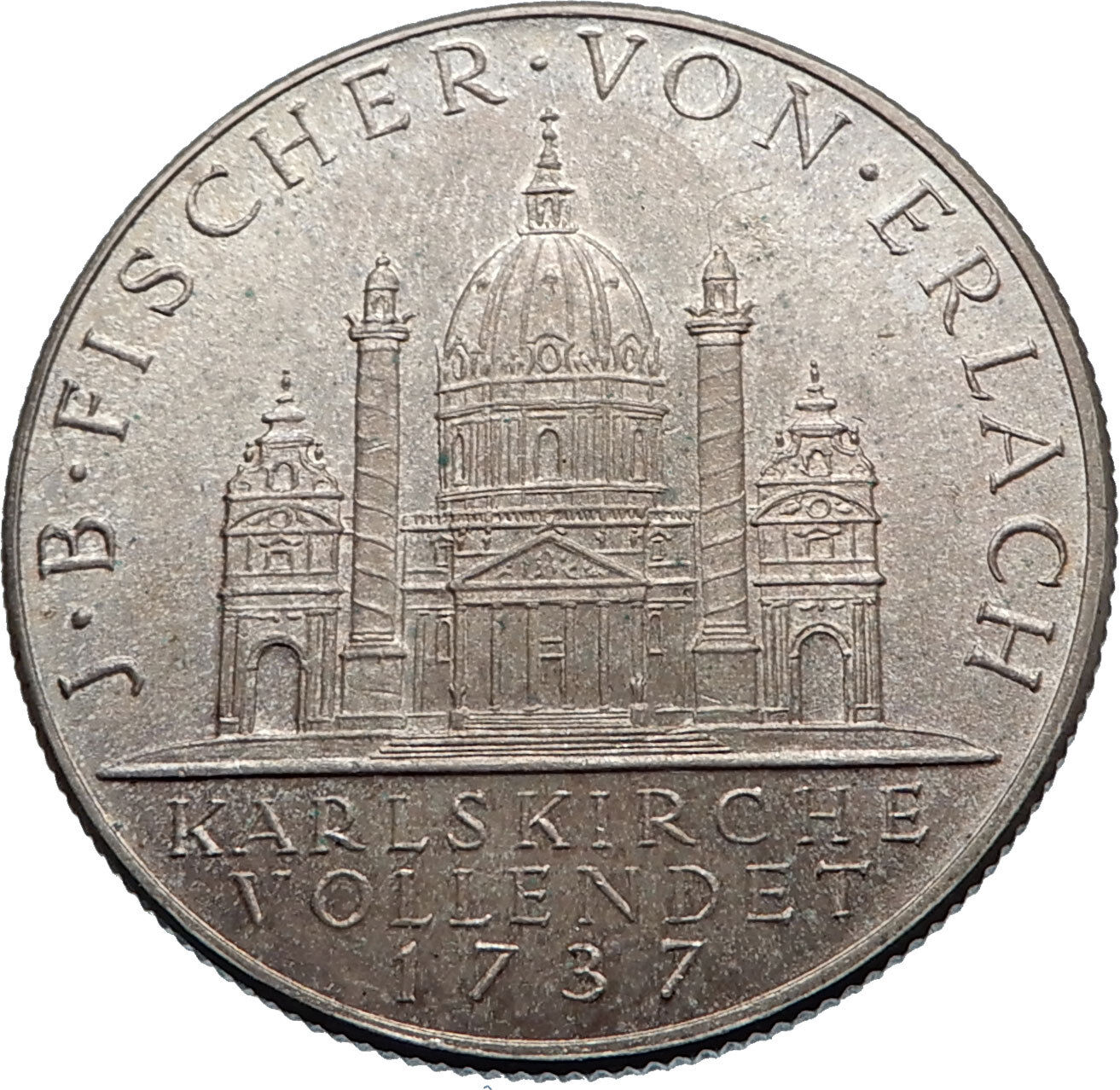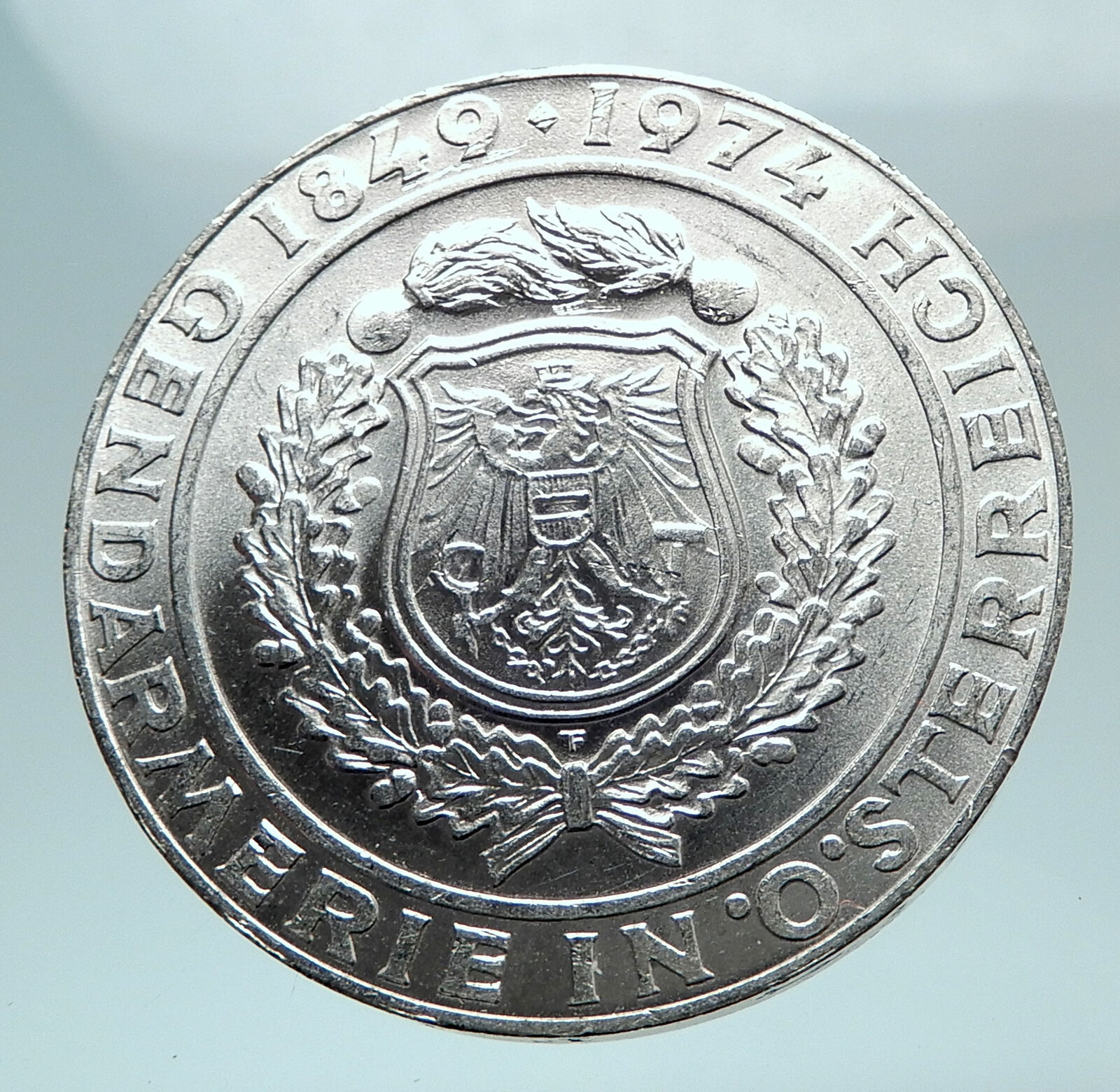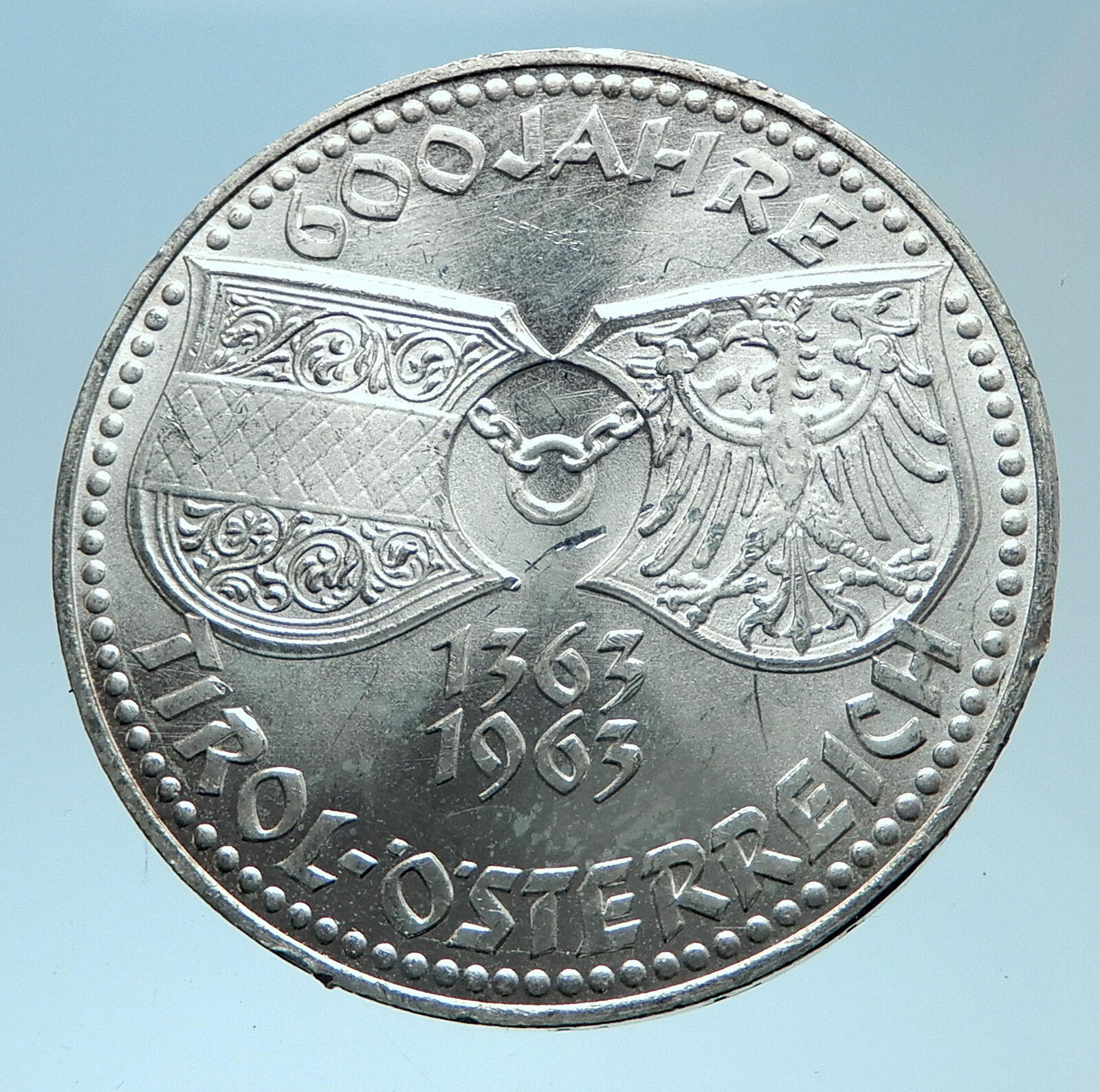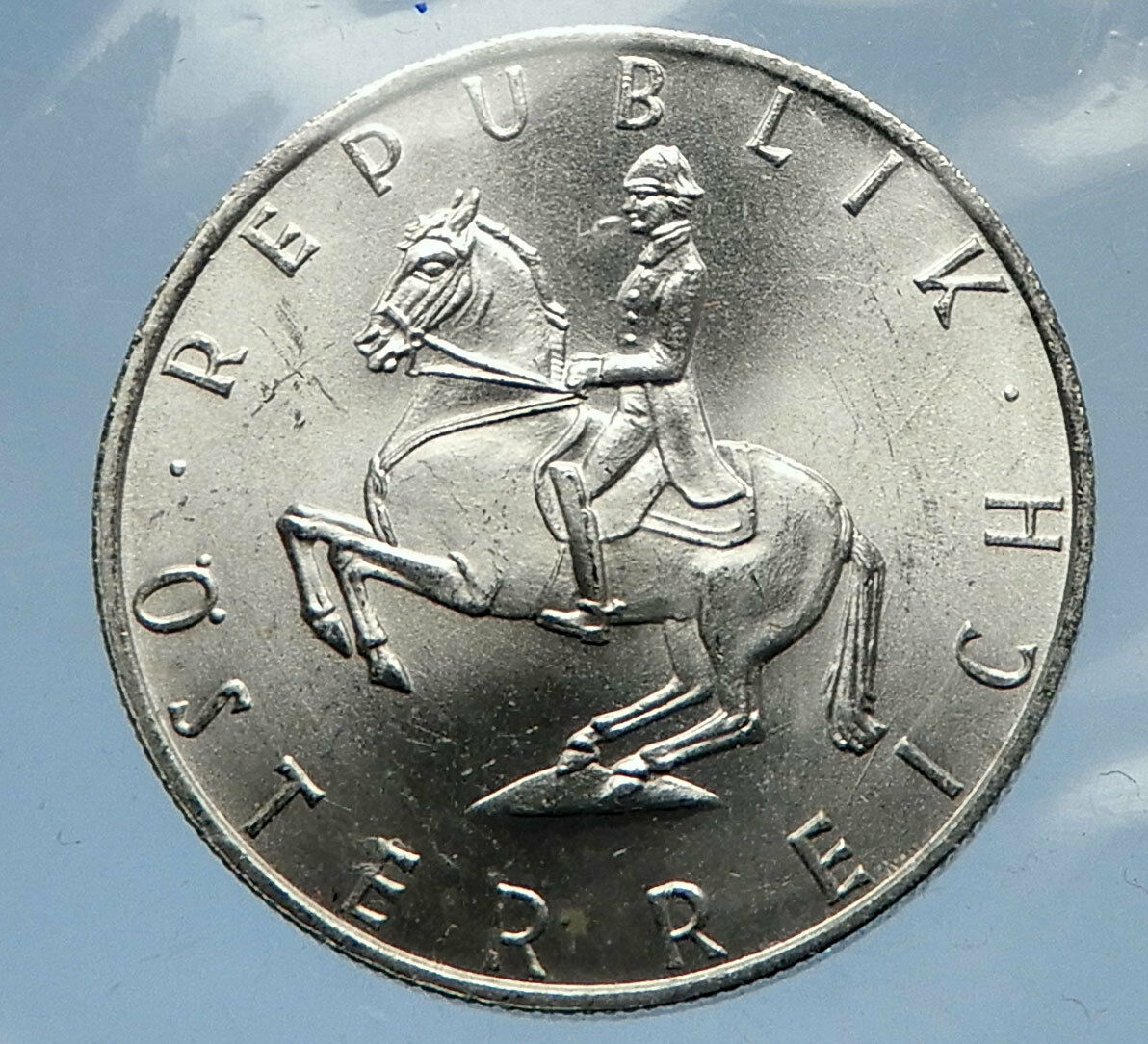|
Austria
80th Anniversary – Birth of Julius Raab, Chancellor
1971 50 Schilling 23mm (20.07 grams) 0.900 Silver (0.575
oz. ASW)
Reference: KM# 2911 Obverse Desinger: Edwin Grienaeur Reverse Designer: Hans Kӧttenstorfer
1989 ◦ ING ◦ JULIUS RAAB ◦ 1964, Head of Julius
Raab right.
REPUBLIC ◦ OSTERREICH ◦ around shields; 50 SCHILLING at center.
You are bidding on the exact item pictured,
provided with a Certificate of Authenticity and Lifetime Guarantee of
Authenticity.

Julius
Raab (29 November 1891 – 8 January 1964) was a conservative
Austrian
politician
, who served as Federal
Chancellor of Austria
from 1953 to 1961. Raab
steered
Allied-occupied Austria
to independence, when
he negotiated and signed the
Austrian State Treaty
in 1955. In internal
politics Raab stood for a pragmatic
social partnership
and the “Grand
coalition” of Austrian Conservatives and
Social Democrats
.
Biography
Raab was born into a middle-class Catholic family in
Sankt Pölten
,
Lower Austria
, the son of a master builder. He
attended a Catholic high school and in 1911 enrolled at the
Vienna University of Technology
to study
civil engineering
. He was drafted into the
Austro-Hungarian Army
as a
pioneer
officer before graduation and fought on
the
Russian
and
Italian
fronts of
World War I
. After the defeat of
Central Powers
Raab returned to the university
and engaged in politics. He married Harmine Haumer in 1923.
The death of his father and the beginning of his political career in the
First Austrian Republic
compelled Raab to drop
out of the university in 1925. From 1927 to 1934 he was a member of the
National Council
parliament as a Lower Austrian
deputy of the
Christian Social Party
. Backed by Chancellor
Ignaz Seipel
, he was also active in the
Heimwehr
paramilitary arm of right-wing
political forces, and was appointed chief for Lower Austria in 1928. However,
his attempts to bind the paramilitary forces to the Christian Social Party
ultimatively failed. In 1932 he joined the Catholic
Ostmärkische Sturmscharen
forces led by his
party fellows
Kurt Schuschnigg
and
Leopold Figl
. In 1933 Raab joined the
Fatherland’s Front
, the newly established
right-wing coalition led by Chancellor
Engelbert Dollfuss
. During the
austrofascist
period of 1934–1938 Raab
progressed through the ranks of the
Corporate State
, and was appointed Minister of
Commerce by Chancellor Schuschnigg just four weeks before the 1938
Anschluss
to
Nazi Germany
.
Raab was ousted after the Anschluss but, unlike many other Austrian
political leaders, escaped death or imprisonment through the help of the Lower
Austrian Nazi Gauleiter
Hugo Jury
, whom he knew personally. He was
never involved in the
Austrian resistance
but kept in touch with the
old Christian Democrat elite and supported his fellow Leopold Figl after his
release from imprisonment.
In April 1945, Raab was made a member of
Karl Renner
‘s provisional government, formed in
the Soviet
zone of occupation in Austria. Raab
co-founded the conservative
Austrian People’s Party
(ÖVP), which denounced
the dark legacy of the 1930s, and assumed leadership of ÖVP parliamentary group
after the
legislative elections held in November 1945
.
However, he represented the austrofascist forces of the past that were
unacceptable to the Soviets, and for a while was “relegated to the back seat”.
From 1947, he expanded his influence through presidency in the
Austrian Federal Economic Chamber
, the
institution tasked with managing social partnership of the government, the
political parties, the entrepreneurs and the employees’ trade unions. He clearly
favored a
free market
and minimal government regulation
of the economy. On the other hand, Raab also held talks with former Austrian
Nazi officials like
Wilhelm Höttl
and
Taras Borodajkewycz
on their support for ÖVP
politics.
April 1955: Chancellor Raab (right) meets Molotov (left) in Moscow
Raab succeeded Leopold Figl as ÖVP party chairman in 1951 and as Federal
Chancellor in 1953. Despite clearly Western attitudes, Raab established
excellent relations with post-Stalin
Soviet Union. In February 1955
Vyacheslav Molotov
proposed resuming the talks
on Austrian independence. On 12 April 1955 Raab, Foreign Minister Leopold Figl
and State Secretary
Bruno Kreisky
arrived in Moscow for the
negotiations that paved the way to the
Austrian State Treaty
concluded in Vienna on 15
May. Austria
declared neutrality
, as did all individual
Bundesländer
. The success of 1955 marked
the peak of ÖVP influence, accompanied by a strong economic revival (Wirtschaftswunder)
and
full employment
. The party won 46% of the
popular vote in the
1956 elections
, Raab retained his seat as
Federal Chancellor. Despite criticism within the party, Raab strongly favored a
tight coalition with the Social Democratic Party under
Adolf Schärf
. In 1957 he and trade union chief
Johann Bohm
co-founded the Joint Commission on
Wages and Prices, the
social partnership
institution that became a
cornerstone of Austrian
corporatism
.
In 1957 Raab suffered a light
stroke
. By the end of the 1950s, his own career
and his party’s influence declined. In 1961 he passed ÖVP leadership to
Alfons Gorbach
, who also succeeded him as
Federal Chancellor on April 11. On 28 April 1963 Raab competed in the
presidential
elections but lost to incumbent
Adolf Schärf. His health rapidly deteriorated, and he died, aged 72, in
Vienna
on 8 January 1964.
![Location of Austria (dark green)– in Europe (green & dark grey)– in the European Union (green) – [Legend]](https://upload.wikimedia.org/wikipedia/commons/thumb/9/9d/EU-Austria.svg/250px-EU-Austria.svg.png)
 Austria, Austria,
officially the Republic of Austria (German: Republik
Österreich), is a
federal republic
and a
landlocked country
of over 8.5 million people
in Central Europe
. It is bordered by the
Czech Republic
and
Germany
to the north,
Hungary
and
Slovakia
to the east,
Slovenia
and
Italy
to the south, and
Switzerland
and
Liechtenstein
to the west. The territory of
Austria covers 83,879 square kilometres (32,386 sq mi). Austria’s terrain is
highly mountainous, lying within the
Alps; only 32% of the country is below 500 metres (1,640 ft), and its
highest point is 3,798 metres (12,461 ft). The majority of the population speak
local
Bavarian
dialects of
German
as their native language, and
Austrian German
in its standard form is the
country’s
official language
. Other local official
languages are
Hungarian
,
Burgenland Croatian
, and
Slovene
.
The origins of modern-day Austria date back to the time of the
Habsburg dynasty
when the vast majority of the
country was a part of the
Holy Roman Empire
. From the time of the
Reformation
, many Northern German princes,
resenting the authority of the Emperor, used
Protestantism
as a flag of rebellion. The
Thirty Years War
, the influence of the
Kingdom of Sweden
and
Kingdom of France
, the rise of the
Kingdom of Prussia
, and the Napoleonic
invasions all weakened the power of the Emperor in the North of Germany, but in
the South, and in non-German areas of the Empire, the Emperor and Catholicism
maintained control. During the 17th and 18th centuries, Austria was able to
retain its position as one of the
great powers
of Europe and, in response to the
coronation of Napoleon
as the
Emperor of the French
, the
Austrian Empire
was officially proclaimed in
1804. Following Napoleon’s defeat, Prussia emerged as Austria’s chief competitor
for rule of a larger Germany. Austria’s defeat by Prussia at the
Battle of Königgrätz
, during the
Austro-Prussian War
of 1866 cleared the way for
Prussia to assert control over the rest of Germany. In 1867, the empire was
reformed
into
Austria-Hungary
. After the defeat of France in
the 1870
Franco-Prussian War
, Austria was left out of
the formation of a new
German Empire
, although in the following
decades its politics, and its foreign policy, increasingly converged with those
of the Prussian-led Empire. During the 1914
July Crisis
that followed the assassination of
Archduke Franz Ferdinand of Austria
, Germany
guided Austria in issuing the
ultimatum
to
Serbia
that led to the declaration of
World War I
.
After the collapse of the Habsburg (Austro-Hungarian) Empire in 1918 at the
end of World War I, Austria adopted and used the name the
Republic of German-Austria
(Deutschösterreich,
later Österreich) in an attempt for union with
Germany
, but was forbidden due to the
Treaty of Saint-Germain-en-Laye (1919)
. The
First Austrian Republic
was established in
1919. In the 1938
Anschluss
, Austria was occupied and annexed by
Nazi Germany
.[14]
This lasted until the end of
World War II
in 1945, after which Germany was
occupied by the Allies
and Austria’s former
democratic constitution was restored. In 1955, the
Austrian State Treaty
re-established Austria as
a sovereign state, ending the occupation. In the same year, the
Austrian Parliament
created the
Declaration of Neutrality
which declared that
the Second Austrian Republic would become permanently
neutral
.
Today, Austria is a parliamentary
representative democracy
comprising nine
federal states
. The capital and largest city,
with a population exceeding 1.7 million, is
Vienna
. Austria is one of the
richest countries in the world
, with a nominal
per capita GDP of $52,216 (2014 est.). The country has developed a
high standard of living
and in 2014 was ranked
21st in the world for its
Human Development Index
. Austria has been a
member of the United Nations since 1955,
joined the European Union
in 1995, and is a
founder of the
OECD
. Austria also signed the
Schengen Agreement
in 1995, and adopted the
euro in 1999.
|







![Location of Austria (dark green)– in Europe (green & dark grey)– in the European Union (green) – [Legend]](https://upload.wikimedia.org/wikipedia/commons/thumb/9/9d/EU-Austria.svg/250px-EU-Austria.svg.png)
 Austria,
Austria,



